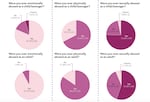A survey of women incarcerated at Coffee Creek Correctional Facility (CCCF) shows widespread reports of past domestic violence and childhood trauma.
Sixty-nine percent of women surveyed said past trauma led to their involvement in the criminal justice system.

Image courtesy of the Oregon Justice Resource Center
The survey was conducted by the Oregon Justice Resource Center in partnership with Portland State University.
The survey was divided into two parts — one focused on trauma associated with domestic violence and the second focused on other types of trauma. More than 200 women in total at CCCF participated in the survey.
Of those women, 65 percent who were in a relationship at the time of their arrest reported experiencing intimate partner violence such as physical violence, threats of harm and verbal insults.
Some women talked about how being in an abusive relationship led to their convictions, such as forming a drug habit to "self-medicate, or committing crimes to support their drug use as well as their partners," the report said.
The second part of the survey focused on more general trauma. A majority of women reported childhood abuse and further abuse into their adult lives.
For abuse in childhood and teenage years, more than 80 percent of women surveyed reported they were abused emotionally, almost 70 percent said they were abused physically and 75 percent said they experienced sexual abuse in their young lives.

The Coffee Creek Correctional Facility in Wilsonville, Oregon, opened in 2001.
Aaron Scott / OPB
Those numbers were similar for adulthood with over 90 percent of women surveyed reporting adult emotional abuse, 84 percent reporting physical abuse and 55 percent reporting sexual abuse.
“To our knowledge, this is the first time anyone has gone in-depth in asking women at CCCF about their experiences throughout the criminal legal process,” said Bobbin Singh with the Oregon Justice Resource Center. “We covered a lot of ground but when deciding where to start with releasing the results, it was obvious that we had to make intimate partner violence and trauma a priority because the rates we were seeing were so high.”
The report concludes that amendments should be made in Oregon's sentencing to consider the history of trauma in women's lives.
"Our current criminal system was not developed with women in mind," the report said, "and is not well-designed to consider the involvement of defendants' histories of victimization and trauma."
The report also calls for those involved in the criminal justice system to review training, policies and procedures that could be damaging to traumatized incarcerated women. It also calls for more widespread education for those in law enforcement, as well as judges and prosecutors.
“This information will not be a surprise to anyone who has worked with the women at Coffee Creek and talked with them about how trauma and abuse have contributed to their ending up in prison,” said Singh. “We must reform our legal system to better meet their needs."
The report said the Oregon Justice Resource Center is working with CCCF to conduct the survey again with a larger number of participants in the future.
